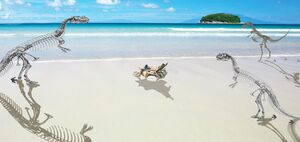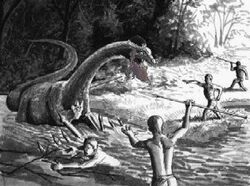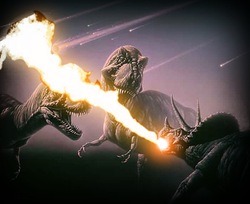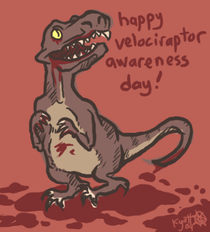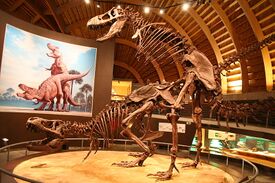Dinosaur

Dinosaurs have roamed the earth and mastered the sky for over six hundred million years (give or take tens of millions). The various species carved out niches and lived either side by side in peace with each other or, in the case of the predators, roamed at will through their territories in search of prey. They have survived many close calls which would have devastated the dinosaur population, including what astrophysicists call several large "missed by just a whisker" asteroid strikes. The relentless prosperity of these noble creatures was unchecked until the most intelligent of mammals — Homo sapiens — came down from the trees and moved onto the plains.
Dinosaurs have become a major media sensation because of human civilization's increased destruction of their habitat. When jungles, prairies, forests, and other prime dinosaur ecological communities are destroyed, these noble creatures have to come into cities and towns to search for food and shelter. Humans have always lived in peace with the tinier feathered dinosaurs, and until now, the larger dinosaurs were naturally skittish and avoided humans. Due to environmental destruction, this relationship is proving increasingly difficult, and the bigger specimens no longer keep to themselves.
Habitat and diet
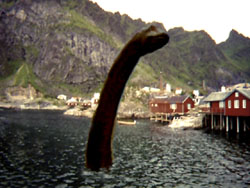
When humans evolved six thousand years ago from apes and quickly learned how to make fire, speak in understandable grunts, and build pyramids and cave dwellings, dinosaurs generally ignored them. Even as recently as fifty years ago, no one could have predicted the emergence of the industrial age, the subsequent growth of cities, and the mass devastation of dinosaur habitat. Now the two life forms have been forced to get along together, and this has led to new experiences for both species.
Due to deforestation, dinosaurs had less and less of their natural habitat in which to stop slowly in. This led them to suddenly run out of the forest and look around, which led to the increased urbanization of dinosaurs. This increased the breadth of their diet as well, as now dogs, possums, skunks and leftovers come into play.
In fact, many people have started to put out treats for dinosaurs. Piles of leaves can be found in the fall, carefully gathered from lawns and placed in the street by the curb. Dinosaurs eat these buffets as if leaves are going out of style. And many people are leaving their dead relatives and pets on the curbs to happily see them skinned, deboned, and devoured within minutes. As an added benefit, dinosaurs are clean eaters, and, like raccoons, wash their food if they can. Backyard swimming pools suddenly take on a new look when raccoons and dinosaurs compete to see who can clean their food the quickest. Dinosaurs usually win because, before long, they are cleaning the raccoons!
Dinosaurs among us
All types of miniature dinosaurs, or "dinos", have been brought into our cities, towns and homes for labor or companionship, but primarily for dino labor. Many of these dinos have replaced the saber tooth cat, or Merychippus, and joined the family unit as welcomed substitutions for traditional pets. This is due to their friendly nature and lower housing costs. Many of the tiniest flesh-devouring subjects are carried in purses or knapsacks as conversation pieces, and are taken to posh diner-parties or outdoor meals to be fed directly from plates and to make cleanup a snap!
There was, however, one incident in Tokyo in early 2011 where the dino mistook the owner's hand for the table scraps, and, unfortunately, devoured it. Adding insult to injury, the bill for that night's meal was over five hundred yen. That incident was of course nothing compared to the one that occurred in Chicago the summer of 1994. The dino ate a man's whole arm, and the bill was seven hundred dollars.
Hunting
Dinosaur poaching has marred human-dinosaur relations to the extent that most nations have instituted the death penalty for those caught red-handed (literally; they have to be caught with dinosaur blood on their hands, which is why most poachers wear gloves).
The outlawing of dinosaur hunting, including all small dinos such as wild turkeys, geese, ducks, crows and baby sun bees, has eased most hostilities between humans and dinos, but the poaching problem still raises its ugly head. Der Internationale Anschluss des Pochierens (in Japanese 国际偷猎者联合) or International Poachers Union insists that its members simply cannot afford food[1], and lack sufficient intelligence to grow it themselves, so they must, "take the beasties down". Anti-poaching hippies, including United Nations Secretary General Wildflower Sunshine, have passed so many laws protecting dinosaurs that entire conferences have been held to think up at least one more new anti-poaching law, to no avail. (By comparison, the United States has at least 47 government agencies that are responsible for stopping dinosaur hunting, and at least 43 that support it). Their next target: Gloves.
Theme parks
Known as the "Happiest Place on Earth," Dinoland has been entertaining children for several years now. Smaller dinos have volunteered to be trained to play putt-putt golf, ride the bumper cars, and chase entire families as they come down the chute on the waterslide. Nobody can hold a candle to the smile that a well-placed dinosaur puts on the face of your child!
The two Dinolands — situated in easily accessible Paris, France, and Toronto, Canada — have spurred imitators as far away as Peru (although these faux attractions have no dinosaurs, they do have several foam facsimiles expertly manipulated to chase families down the waterslides). Only recently have the dinosaurs demanded union representation, and this has caused several work stoppages, very loud picket lines, and the unfortunate loss of several management negotiators.
But when all is well and the sun is shining, there is nowhere children would rather be than rubbing the belly of a dinosaur for luck and giving chase to their siblings from atop a triceratops.
PETA
Founded specifically to protect large dinosaurs, PETA (People for Ethical T-Rex Assistance) has recently turned its formidable publicity machine to make sure smaller dinosaurs are also treated fairly. "After all," said PETA spokesperson Bess T. Ality, “scientists all agree that birds are dinosaurs. Really, there's not much difference between a Tyrannosaurus rex and a hummingbird, is there?"
In 2008, PETA organized a campaign to assure that Triceratops were given the right, though United Nations General Assembly resolution, to eat leaves when and where they wanted to, without human interference. Herds of the gentle giants, some with neighborhood children cheerfully riding atop their head shields, began to populate parks and arboretums, cutting the grass and
the trees as effectively as a well-paid union worker.
PETA continued to expand its focus to include the plight of hundreds of other dinosaur species. The group has stood at the forefront of granting freedom and peaceful coexistence to our roaring, rampaging, and carnivorous brothers and sisters.
Unfortunately, the organization suffered a couple of failures. Several people lost an arm or two during the recent "Velociraptor Awareness Day and Million-Dino March". And the group's headquarters’ suffered severe damage after their ill-advised Bring-A-Dino-To-Work Day. PETA president Ingrid Newkirk said, "Perhaps next time we'll add some tomatoes to the carnivores' vegan salad. They seem to prefer eating things colored red."
Breeding
Owing to the gentleness of their nature and the sheer fragility of their ancient skeletons, dinosaurs generally breed very gently. But that does not mean they dont like to have fun while at the job. Dinos can be very creative about the act of copulation and it is said that it was dinos who taught most of the sexual positions to the ancient Hindu sage Vatsayana, who infringed all the copyright codes of that time and published the much-hyped and falsely credited Kama Sutra. In fact, we now know that the original manuscript of this magisterial work of copulation kinetics includes demonstration images modelled not by humans, but by dinosaurs. In fact, the anger of those dinosaurs led them to launch the field of porn with the bondage genre in which they compelled humans to indulge. So we can credit the dinosaurs for the world's most innovative and lucrative industry.
Popular culture
As human-dinosaur dynamics are being blurred by societal acceptance and new laws, dinosaurs are entering into popular culture in ways which would have been unheard of a few years ago. Just as gay people were silent and shunned as late as last Thursday, dinosaurs have emerged as our new darlings of the media.
As with all things human, some dinosaurs have been put to work in sales. Who better to shake those last quarters loose from grandma's dusty purse than a thunder lizard? When a brontosaurus tells her to buy something, the money's on the counter. "That's how much drawing power and pizzazz they have," said a spokesman for Absolut. European trends and designs now include the latest dinosaur-endorsed cosmetics and fashions, and when the more prominent dinosaurs started to wear bling, the sales of claw rings, tail garb, and giant nipple rings went through the roof (in some cases, literally).
Dinosaurs working at parks, pizza parlors, or as referees at sporting events have become so commonplace that humans no longer even notice the subtle changes. Fox News spokesman Bill O'Reilly said, "creeping dinosaurism, entering every aspect of human society, can only lead humans down the primrose path of gotch'ya, and before they know it they will be the ones serving dinosaurs plates of human legs, breasts, and white meat in restaurants." Most dismiss this dismal view, "poo-poo" the more frightful scenarios, and insist that the future of dino-human relationships is bright, long, and full of promise.
The future of dinosaur-human relationships
Dinosaur footprints
- ↑ Because of the high union dues.
See also
- Earth's Children
- HowTo:Clone a dinosaur
- Judaeo-Palaeontology
- Jesusaurus Rex
- Coffee dinosaur
- Koshersaur
- 2019 in koshersaur paleontology
- Dino
- Marty the Magic Dinosaur
| Colonized version: 22 March 2011 | |
This formerly savage article is brought to you, and your Christian God, by your resident Lobsterbacks. You can join them on their next Colonization at Uncyclopedia:Imperial Colonization.
| |
| Featured version: 6 April 2011 | |
| This article has been featured on the main page. — You can vote for or nominate your favourite articles at Uncyclopedia:VFH. | |
